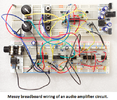dksucharda
New Member
Happy new year! This is my first post and I just purchased a soldering iron and a DIY fm radio kit to practice soldering and learn some basics. I assume this will end pretty quick and then want to move on to the next level so I am purchasing a book;

It looks like most of the projects in here are done with a breadboard and that is fine. But where do I get all the parts; wires, resistors, capacitors, etc... to build the projects. I see where amazon has a whole bunch of kits that are for Arduino or Rasberry Pi, but I am not looking to do any computer programing electronics. I am looking to work on vintage stereo equipment, fix radios, make guitar pedals, and maybe amplifiers. What is the best way for me to go about this? What should I be looking for and where. I would think there is a Bread board Kit that has not only the Bread board but a lot of basic components for building the circuits. Thank you.
It looks like most of the projects in here are done with a breadboard and that is fine. But where do I get all the parts; wires, resistors, capacitors, etc... to build the projects. I see where amazon has a whole bunch of kits that are for Arduino or Rasberry Pi, but I am not looking to do any computer programing electronics. I am looking to work on vintage stereo equipment, fix radios, make guitar pedals, and maybe amplifiers. What is the best way for me to go about this? What should I be looking for and where. I would think there is a Bread board Kit that has not only the Bread board but a lot of basic components for building the circuits. Thank you.





